
A grassroots social welfare program from the progressive years of the Whitlam Government is a model way to create more coherent and vibrant communities – and should be revived to steer future policy, a new research project has found.
The lasting importance and influence of the Australian Assistance Plan (AAP), a largely unheralded funding scheme of the 1970s which aimed to support and enable urban and rural community social welfare initiatives, has been highlighted in a project called “Bold Experiment”.
“The current crop of politicians can learn greatly from what we found during our research; that the influence of such community-focused schemes resonates greatly through society for a long, long time,” says Professor Melanie Oppenheimer, who led the project with Professor Erik Eklund (Federation University) and Professor Joanne Scott (University of the Sunshine Coast).
“I’d go so far as saying we need another scheme like the AAP, to answer the call in our communities for a lot of important social services,” Professor Oppenheimer says.
The program helped to establish a range of relevant and robust neighbourhood services, childcare and community centres run by a new wave of local supporters and volunteers, according to oral testimonies given to Bold Experiment project researchers.
For example, valuable organisations that were initially funded by AAP – such as the Marrickville Women’s Shelter in Sydney, and many of Australia’s first childcare centres – continue to exist and are proof of the enduring value of the program.
“Politicians ignore the power of such grassroots projects at their peril.”
“It set a tone for community involvement among that generation which continues today,” with the Mackay and Inner Sydney Regional Councils for Social Development still going and the AAP helping to fund organisations now operating as the Tenants’ Union of NSW and Federation of Ethnic Communities’ Councils of Australia.
Professor Oppenheimer believes the AAP directly plugged into the Flinders University spirit of adventurous experimentation and social action. Young academics in the 1970s, such as Flinders University Professor of Public Policy Adam Graycar, were evaluators of the AAP and the experience for them was life changing.
Inspired by Gough Whitlam’s ‘Power and the Passion’ catchcry, the radical Australian Assistance Plan introduced in 1973 gave federal funding to grassroots community organisations throughout the nation for the first time.

The dynamic oral histories paint a very positive picture of the short-lived program which was scrapped in 1977 by the Fraser Government.
“It provided the launching pad for a whole generation of social workers and social policy practitioners who are now prominent leaders in a variety of fields, and therefore it set the groundwork for modern social policy,” says Professor Oppenheimer, who points to the example of high-profile public servant Sue Vardon AO (who will launch a new book The State of Welfare in Adelaide this week).
Sue Vardon, who gave evidence to the Bold Experiment project, starting her career as a social worker with Wagga Wagga Council and helped set up the Riverina Regional Council for Social Development as part of the AAP’s rollout.
Federation University researcher Professor Eklund says the project looking at social policy in the 1970s in Australia learnt from international comparisons.
“The edited collection, State of Welfare, arose out of our attempts to bring together colleagues from Canada, New Zealand, Germany, Ireland and Sweden in order to understand this period and some of the global changes that were occurring,” says Professor Eklund.
“I was based at University College Dublin in Ireland at the time so we used that opportunity to bring together international scholars and widen the scope of our research.
“The Australian Assistance Plan was an ambitious program that changed the national social policy debate in the 1970s. But it also had very important implications for regional Australia because it looked at new ways to support and involve regional communities.
The Plan established Regional Councils for Social Development in 35 pilot regions throughout Australia. These organisations attempted to involve people in social policy planning.
“A lot of our current consultation and engagement strategies in regional development for example come from those first experiments in the early 1970s,” he says.
The ‘Bold Experiment: An historical evaluation of the Australian Assistance Plan’ was funded by an Australian Research Council Discovery grant.
The oral histories and other materials will be housed in the Flinders University Library Special Collections and available for consultation by others interested in this vital period of Australia’s history.
Professor Oppenheimer says the power of the AAP was that it “plugged directly into what the community wanted, empowering local groups to decide what they needed most rather than have it imposed on them”.
“It set a path that continues today for robust community activity and involvement. The stimulation of these projects also triggered a rise in volunteering in Australia,” she says.
“My research into the history of volunteering in Australia sees big spikes in activity during World War One and World War Two, which seem obvious enough, but also during the mid-1970s when the AAP scheme played an integral role,” says Professor Oppenheimer.
On the eve of the South Australian election, The State of Welfare will be launched at a special function at Alere Function Centre in Flinders University’s Bedford Park campus at 4pm on Friday 16 March. RSVP online.


